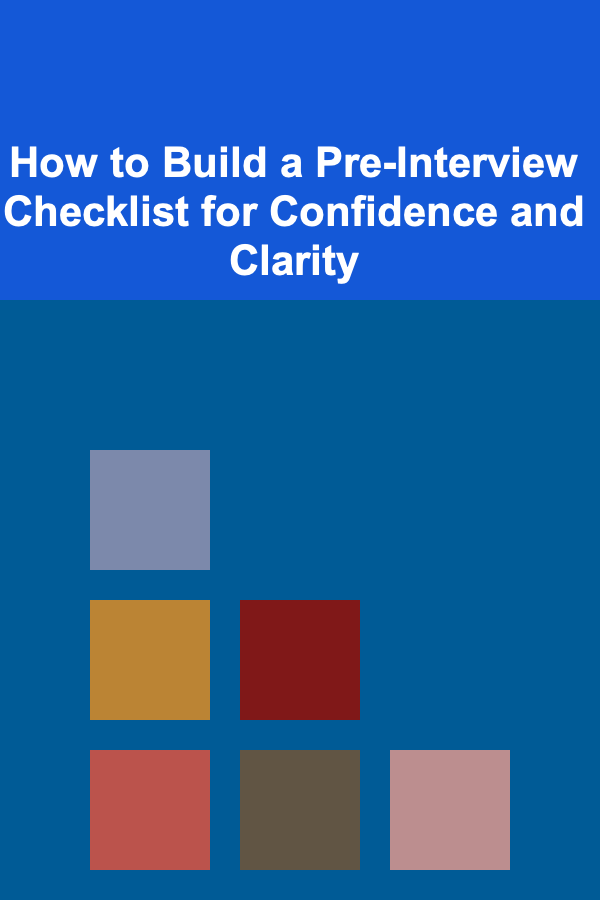
How to Build a Pre-Interview Checklist for Confidence and Clarity
ebook include PDF & Audio bundle (Micro Guide)
$12.99$7.99
Limited Time Offer! Order within the next:

Navigating a job interview can often feel like walking through a maze. From preparing for questions to managing nerves, interviews can present a unique set of challenges for every candidate. However, one of the most effective ways to minimize stress and maximize performance is by building a pre-interview checklist. By preparing in advance, you can walk into the interview with confidence and clarity, which significantly improves your chances of making a lasting impression.
A pre-interview checklist is essentially a list of tasks, strategies, and pieces of information you need to review before you enter the interview room. This guide outlines how to build such a checklist tailored to your personal needs, career goals, and the specific role you're applying for. With this structured approach, you'll be prepared not just to answer questions but to navigate the interview process with ease.
The Importance of a Pre-Interview Checklist
A pre-interview checklist serves several crucial purposes:
- Prevents Forgetfulness: Interviews involve many details, and it's easy to forget important aspects like your resume, portfolio, or the company's background. A checklist ensures you won't miss any key components.
- Reduces Anxiety: Proper preparation is one of the best ways to reduce interview anxiety. Knowing you have covered all the bases gives you a sense of control and confidence.
- Helps You Communicate More Effectively: A checklist ensures that you're ready to answer questions clearly, showcasing your skills, experiences, and alignment with the company's needs.
- Demonstrates Professionalism: A well-organized candidate reflects positively on their professional demeanor. Having everything ready shows you're detail-oriented and serious about the opportunity.
Key Components of a Pre-Interview Checklist
The ideal checklist should cover various areas, including research on the company, preparation for common interview questions, and ensuring logistical elements are in place. Let's break down the essential components of your pre-interview checklist.
1. Company Research
Understanding the company's mission, values, culture, and industry trends is critical for acing any interview. It helps you answer questions intelligently and frame your responses in a way that aligns with their priorities. Here's what you need to cover:
- Company Overview: Know the company's mission, vision, and core values. Research the products, services, or technologies they offer and understand the market they serve.
- Recent News and Updates: Investigate recent press releases, company achievements, or updates. This could give you an edge, especially if an interviewer asks why you want to work there or how you can contribute.
- Company Culture: Understand the company's work environment and culture. You can gather this by reading employee reviews on platforms like Glassdoor or by looking at the company's social media pages.
- Key Competitors: Have an understanding of who the company's main competitors are and how they position themselves in the industry.
- Role-Specific Information: Know what the role entails and how it fits into the company's goals. Review the job description carefully and make a list of key responsibilities.
2. Review of Your Resume and Portfolio
Before the interview, take time to refresh your memory on everything in your resume, portfolio, or work samples. Being able to speak fluently about your experiences, accomplishments, and skills will make a huge difference. Here's how to prepare:
- Know Your Resume Inside Out: Be prepared to discuss any section of your resume in detail, including job responsibilities, accomplishments, and reasons for leaving previous positions.
- Prepare to Tell Your Story: Craft a concise career narrative that connects your skills and experiences with the requirements of the job. Be ready to talk about key projects or roles that make you an ideal candidate.
- Portfolio Review: If your profession requires a portfolio (design, writing, engineering, etc.), make sure it's updated and organized. Select a few key pieces to present during the interview.
- Prepare Examples: Be ready to give concrete examples of your work, especially in areas that the employer has identified as important in the job description. Use the STAR method (Situation, Task, Action, Result) to outline your responses.
3. Mock Interviews and Practice Questions
Rehearsing answers to common interview questions is one of the best ways to boost confidence. Practice allows you to identify potential gaps in your responses and refine your answers. Here's what to do:
- Common Questions : Prepare answers for frequently asked questions such as:
- Tell me about yourself.
- Why do you want to work here?
- What is your greatest strength/weakness?
- Describe a time when you faced a challenge at work.
- Where do you see yourself in five years?
- Behavioral Interview Questions: These questions often focus on your past experiences and how you've handled situations. Practice answering these using the STAR method.
- Role-Specific Questions: Prepare for questions specific to the role you're applying for. This could include technical questions, case studies, or hypothetical scenarios.
- Your Questions for the Interviewer: Prepare a few insightful questions to ask the interviewer. These could be about team dynamics, the company's goals, or specific challenges the role might face.
4. Dress Rehearsal
Your appearance is often the first thing an interviewer will notice, so it's crucial to be well-groomed and dressed appropriately. The dress code will vary depending on the industry, but here's how to approach it:
- Dress for the Job: Research the company's dress code (business casual, formal, creative) and plan your attire accordingly. If in doubt, it's better to err on the side of dressing more formally.
- Fit and Comfort: Ensure your clothes are clean, pressed, and fit well. Comfort is important, especially if you have to sit for extended periods.
- Professional Grooming: Pay attention to personal grooming, such as hair, nails, and accessories. Avoid overly flashy jewelry or strong fragrances.
5. Logistics
One of the most overlooked aspects of preparation is ensuring that logistical elements are in place for the interview day. Being late or unprepared can make a negative impression. Here's what to check:
- Location and Time: Double-check the date, time, and location of the interview. If it's virtual, ensure you have the necessary technology set up, including video conferencing software and a stable internet connection.
- Interview Format: Determine whether the interview will be one-on-one, a panel interview, or a video interview. Tailor your preparation accordingly.
- Directions and Parking: If the interview is in person, check the location in advance and plan your route. Allow for extra travel time to avoid being late. If necessary, confirm parking details.
- Documents: Bring multiple copies of your resume, your portfolio (if relevant), and any additional documents requested by the employer. If the interview is virtual, ensure your environment is quiet and professional-looking.
- Confirm Interview Details: If the interview details aren't clear, don't hesitate to contact the recruiter or hiring manager for clarification.
6. Mental and Physical Preparation
Being mentally and physically prepared can have a huge impact on your performance during the interview. Here are some tips to keep in mind:
- Sleep: Get a good night's sleep before the interview. Rest will help you think clearly and feel less anxious.
- Eat Well: Eating a balanced meal before the interview will help ensure you have the energy to stay focused and calm. Avoid heavy, greasy foods or excessive caffeine, as these can make you jittery.
- Relaxation Techniques: Practice relaxation techniques, such as deep breathing or mindfulness exercises, to calm your nerves before the interview. Visualization can also be powerful---imagine yourself succeeding in the interview and walking out confident.
- Confidence Boosters: Stand tall, make eye contact, and smile. Positive body language can help you feel more confident, and it also leaves a positive impression on interviewers.
7. Prepare for the Unexpected
Interviews often don't go as planned. Whether you get an unexpected question or encounter technical difficulties, it's important to stay flexible and calm. Here's how to handle the unexpected:
- Think on Your Feet: If asked a tough or unexpected question, take a moment to gather your thoughts before answering. It's perfectly fine to pause and formulate your response.
- Technical Problems (Virtual Interview): If there are any technical difficulties during a video interview, remain calm and polite. Let the interviewer know that you are aware of the issue and are trying to resolve it.
- Handling Silence: If the interviewer pauses or remains silent, resist the urge to fill the space with unnecessary words. Sometimes, they're just giving you time to think and respond thoughtfully.
Conclusion
A pre-interview checklist is an indispensable tool for anyone preparing for a job interview. It's more than just a set of tasks to check off---it's a roadmap that ensures you're not only ready for the interview but that you can walk in with the confidence and clarity needed to excel. By carefully preparing your company research, practicing common interview questions, and ensuring all logistical details are sorted, you'll create a solid foundation for a successful interview. Most importantly, remember that preparation is key to reducing anxiety, so you can focus on what matters most: showcasing your skills and making a lasting impression.
With a well-organized checklist, you're not just preparing for a job interview; you're preparing for success.
Reading More From Our Other Websites
- [Rock Climbing Tip 101] Best Ways to Document and Share Your Climbing Progress Using GPS Mapping Apps
- [Organization Tip 101] How to Personalize Your Online Learning Environment
- [Paragliding Tip 101] Best Paragliding Training Programs for Disabled Athletes
- [Survival Kit 101] How to Customize a Survival Kit for Seasonal Wildfire Zones
- [Home Staging 101] How to Stage a Home for Investors
- [Home Staging 101] How to Stage Your Home's Laundry Room to Maximize Its Usefulness
- [Home Budget 101] How to Budget for Seasonal Home Expenses
- [Personal Investment 101] How to Build an Emergency Fund While Still Investing
- [Home Space Saving 101] How to Use Compact Furniture to Maximize Space in Small Areas
- [Organization Tip 101] How to Use Labels to Keep Toys Organized

How to Maintain Your Home's Radiators and Baseboard Heaters
Read More
How to Make Sure Your Home Party Is Comfortable for All Guests
Read More
How to Stay Disciplined in Your Investment Strategy
Read More
How To Grasp the Concept of Beauty
Read More
How To Choose the Best Coffee for Cold Brew
Read More
Building a Legacy Through Your Business
Read MoreOther Products

How to Maintain Your Home's Radiators and Baseboard Heaters
Read More
How to Make Sure Your Home Party Is Comfortable for All Guests
Read More
How to Stay Disciplined in Your Investment Strategy
Read More
How To Grasp the Concept of Beauty
Read More
How To Choose the Best Coffee for Cold Brew
Read More